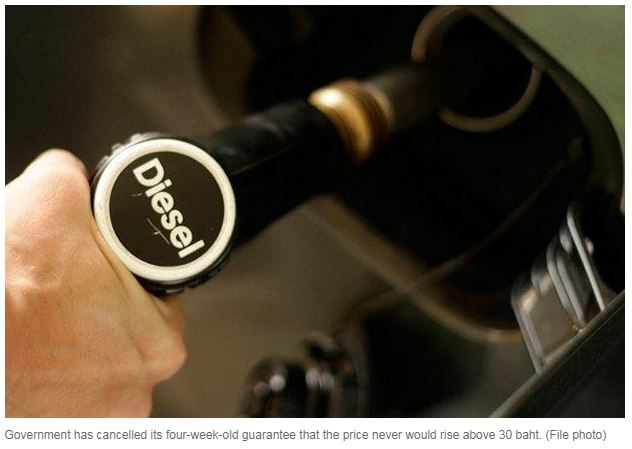Thailand: Diesel cap to rise if $90 mark breached
Energy policymakers will raise the 30-baht-per-litre cap on diesel if oil prices exceed US$90 per barrel, the energy minister says.
The Energy Policy Administration Committee (Epac) is considering whether to carry on with capping the diesel price below 30 baht per litre, as forecasts see global oil prices continuing to rise.
On Tuesday, Brent crude hit a four-year high of $84.80 per barrel, while Dubai crude stood at $82.80 a barrel.
“We would have to increase the budget allocation from the state Oil Fund to subsidise the local price at 1 baht per litre in the near future to keep the price ceiling below 30 baht per litre,” said Energy Minister Siri Jirapongphan.
The state Oil Fund has to subsidise diesel at 60 satang per litre by allocating 6 billion baht for the rest of this year. The subsidy rate is calculated based on the global average price of $85 per barrel.
“Once we raise the ceiling price for diesel, the financial burden on the fund will be lower,” Mr Siri said.
Last Friday, the ministry took action on the capping measure after meeting Epac officials. Epac had raised the issue at the previous meeting on Sept 5.
The capping price policy is part of policymakers’ efforts to ease the impact on local consumers and business operators because diesel is used mainly for the country’s transport and logistics systems.
Earlier, Epac agreed to cap the retail price of cooking gas at 13.08 baht per kilogramme, which comes out to 363 baht per 15kg cylinder, until the end of the year by cross-subsidising 7 billion baht.
The cooking gas account has been overextended, compelling Epac’s decision to borrow cash reserves from the oil-user account. Both accounts are part of the state Oil Fund.
Epac has set aside a subsidy budget of up to 13 billion baht for the two fuels this year.
As of Sept 30, the state Oil Fund stood at 25.14 billion baht. The oil-user account totalled 29.21 billion baht, while the cooking gas account remains overdrawn by 4.07 billion baht.
Moreover, Mr Siri said the ministry has assigned the Energy Policy and Planning Office to study the implementation for capping fuel prices and the resulting outlook.
The first movement is to request local oil traders trim down the gross margin of oil retailers for a while.
Earlier, Epac predicted that prices would rise to above $80-85 per barrel due to economic sanctions by the US government on Iran, then normalise.
But the spike in the crude oil price resulted in Asian diesel prices soaring by about $7 to $95 per barrel and petrol at $92 per barrel.
“We have been highly concerned about the impact of steady increases in the global oil prices over the past two months,” Mr Siri said.
As of Friday, the local diesel price had reached 29.79 baht per litre.
As a result of rising diesel prices, B20 biodiesel has become an alternative fuel for transport and logistics systems. Diesel is blended with 20% methyl ester or crude palm oil, though B7 is still available at petrol stations.
The price of B20 is lower than ordinary diesel by three baht per litre, thanks to a surplus of palm oil in the 2018-19 crop year.
Separately, Kulit Sombatsiri, the newly appointed energy permanent secretary, said the regulations for budgets allocated by the Energy Conservation Fund will soon be revised in a bid for greater transparency in disbursement from the fund.
“The budget allocation must be easily traced and be checked from all records,” Mr Kulit said.
But details of new regulations have yet to reach a conclusion.
The Energy Conservation Fund was established in 1992 to promote energy conservation activities and higher efficiency of energy consumption through soft loans, grants, subsidies, scholarships and advance payments.
The fund collects a levy from all fuel products at 10 satang per litre and generates cash of nearly 3 billion baht per year.
There is no data for budget disbursement because the fund has been used for political interventions and Thai media are not allowed to access or request the fund’s balance sheet to reveal to the public.
The fund’s cash reserves used to reach 14-15 billion baht a year until 2007-08.
Source: https://www.bangkokpost.com/news/general/1551710/diesel-cap-to-rise-if-90-mark-breached


 Thailand
Thailand




